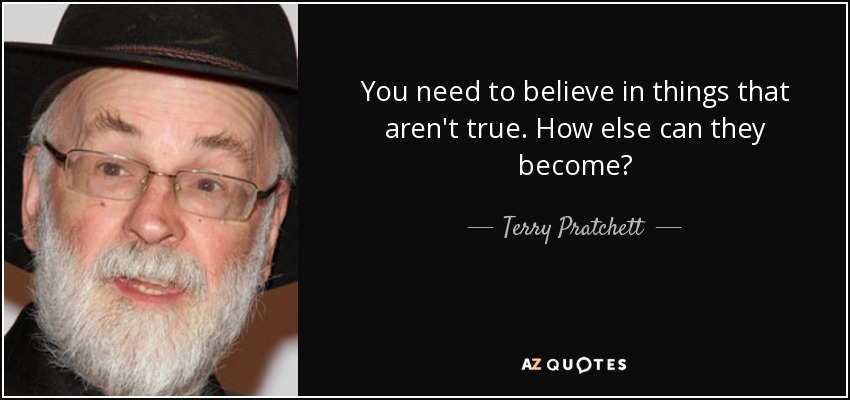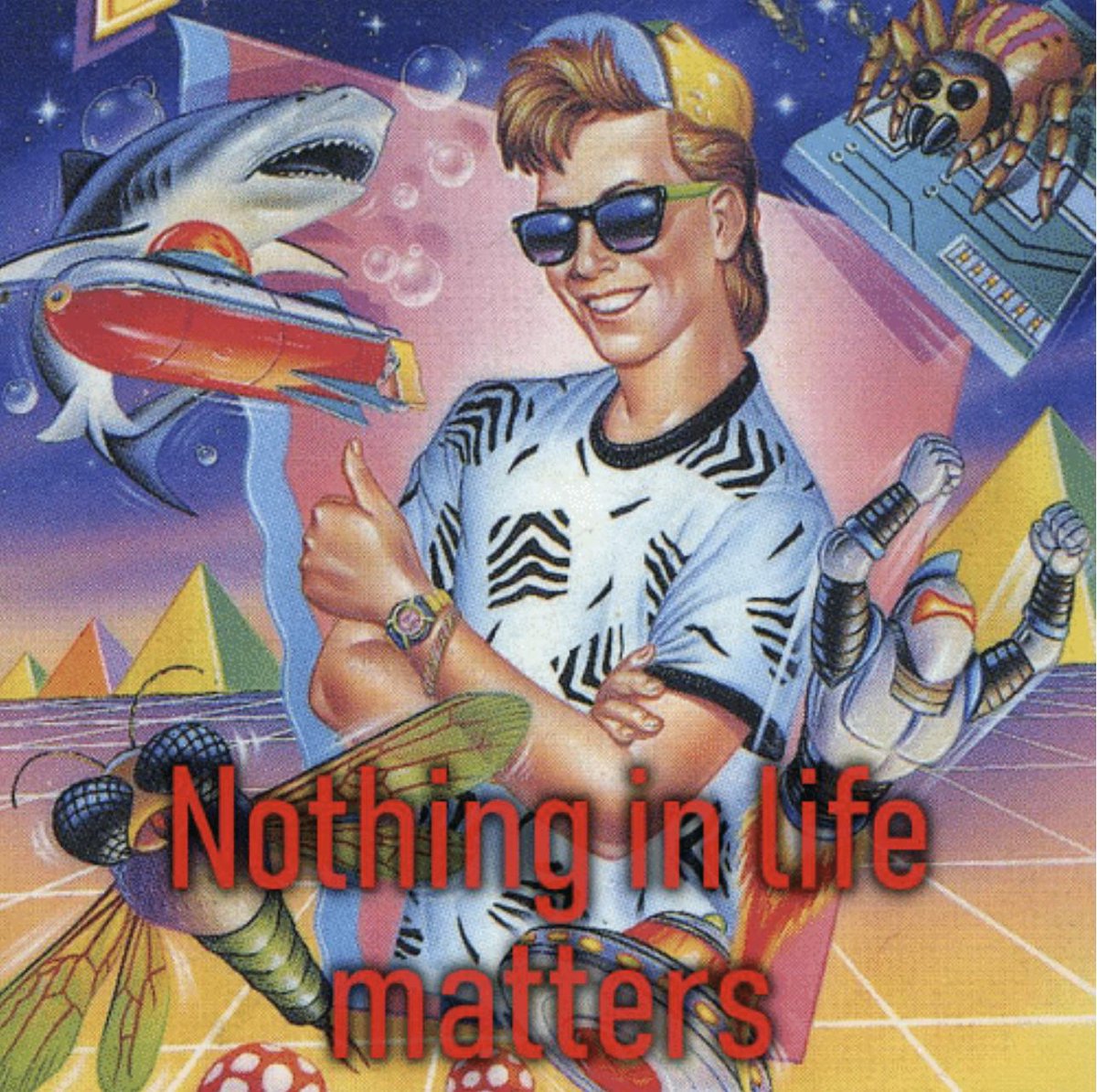mfw I realize that maybe absurdism is my coping mechanism
Sartre says you can be angry and furious at the absurd, Camus says to laugh at it. The absurd is the gap between what we expect to happen, and what actually happens.
Many absurdists also believe in a mind-body split (see Nagel’s “What is it like to be a bat?” essay, available for free in pdf format) or that consciousness may be something other than physical and that’s where I tend to disagree with them. In general, the essays tend to be extremely interesting and worth reading even if you disagree. Philosophical literature is usually written so precisely and specifically that it’s unlike other types of reading.
If you can get to the point that it’s okay that nothing inherently matters, it will no longer need to be a coping mechanism.
Yeah, mine as well.
Nothing matters (so do nothing because there is no reason to do something)
Nothing matters (so do anything because why not!?)
I consider myself as mostly existentialist (nothing matters, so find your own meaning), but absurdism has a strong pull, I must admit.
Existentialism doesn’t necessarily claim that nothing matters, so yours sounds more like optimistic nihilism, which is very similar if not identical to absurdism.
I would probably label myself an optimistic nihilist, and I’m one of the main people spreading such ideas right now.
Thanks for pointing that out. I was trying to be concise and keep in style with the OP, but I may have gone overboard there.
Because I didn’t know absurdism, I read the second one differently at first:
[The] nothing matters.
And I immediately had to think of this gem:
“But it doesn’t do anything!” - “No, it does nothing.”
Nothing really matters, anyone can see.
Nothing really matters
……t’meeeeeeeeeEEEEEEeeeeeeeEeEeEeEe
🎹
I strive to be like Gonzo from the Muppet movies. That whatever is the very picture of the ubermensch.
Hmm. Your ideas are intriguing to me, and I wish to subscribe to your newsletter.
Did you mean optimistic nihilism?
Extremely similar to absurdism.
The absurdism depicted isn’t pure absurdism because there’s the presence of style, which is a system of meaning and value. So, as depicted, that’s more existentialism or a healthy and cool blend of absurdism with existentialism.
Don’t we try to categorize everything though? Like, could you wear a combination of items without someone trying to categorize it into a style? If it were true that you cannot, absurdist style would be impossible to depict visually.
That’s an interesting point.
Upon further reflection, I discovered I don’t fully understand the nuances. So I tried to think it through.
I think it goes as follows:
- Nihilism says there is no meaning so any pursuit whatsoever is futile. (Not goal based.)
- Existentialism says there is no universal meaning but it is the individual who creates meaning. So we project our meaning into the world and live in it and therefore live in a meaningful world. We should search for our personal meaning. (Goal based.)
- Absurdism says there is no universal meaning and if there is, we’ll never understand it. This doesn’t mean we shouldn’t enjoy transient pseudo-meanings, though. In fact, we SHOULD enjoy them. But we should be aware that they’re not eternal and not objective. (Not goal based.)
So, on second thought, I think the meme does a great a job at capturing absurdism. Still, the difference between existentialism and absurdism is subtle.
What do you all think? Is that kinda the idea?
I wonder if Existentialists or Absurdists consider our biological reality and needs when developing the ideas. For instance, we need food, shelter, social acceptance, and so forth. What does this say about “meaning” and pursuits like fashion and style (as it relates to social acceptance?). How does Maslow’s hierarchy of needs fit in with these philosophies?
The way I look at it, the big difference is between existentialism and absurdism lie in the problem of universalism. An existentialist is in many cases also going to be a Christian, possibly a Christian who is having a lot of doubt in their faith or struggling with the problem of evil, things like that. Existential philosophy tries to square the fact that we exist as moral beings but we seem to live in a world that lacks a universal concept of morality, so where does our morality even come from if it is not universal? To the existentialist, morality IS the underlying basic law of nature, and thus morality is itself a higher meaning, but morality is not applied universally, and this is a great conflict.
Absurdists, I feel, ultimately accept the fact that morality is NOT necessarily the basic underlying law of nature. Morality is subjective and it is personal, and it is messy and often falls short. I imagine that the absurdists have already gone through the existentialist crisis and come out on the other side with an acceptance of the seeming meaninglessness of it all, of the fact that our moral scruples are ultimately just a way to cope with existence and not some Higher Truth that we must strive towards.
So, in short:
- Nihilism: Life is meaningless, and all pursuit of meaning is futile. — universalist, negative.
- Existentialism: Life lacks inherent meaning, but we must create our own meaning in a world that often seems indifferent. — subjective (not necessarily universalist), can range from negative to positive.
- Absurdism: Life is inherently meaningless, but we can choose to create and embrace our own meaning, even in the face of the absurd. — subjective, generally positive.
Eh… it’s not that we’re trying to create meaning in the face of the absurd. The absurd is is the condition arising from the contrast between a human need for order and meaning on one side, and a lack of order and meaning (or lack of ability to grasp the order and meaning) on the other… and it’s this absurdity that defines the human condition. And we should embrace it.
Honestly someone who spends their whole life searching for a universal morality could very well be embracing absurdism as well.
I also feel that the positivity surrounding absurdity comes from the fact that the absurd is the struggle (roughly between a desire and search for order and meaning) and the struggle is the human condition. And once you think about the struggle-not as something to overcome or win-but as the basic defining characteristic of humanity… you start to view the whole thing positively.
Well my comment has more upvotes on it than yours, therefore I can objectively posit that my explanation has greater meaning than yours, therefore I am right and you are wrong. This explanation has zero flaws in it whatsoever.
In all seriousness, I appreciate the comment and I generally feel that you encapsulated the idea more eloquently than I did.
Yeah but without your comment I wouldn’t have posted mine!
I imagine that the absurdists have already gone through the existentialist crisis and come out on the other side with an acceptance of the seeming meaninglessness of it all…
That was definitely my experience of it. It helped me grow out of my existential angst learning about absurdists and how they just embrace the madness of it all.
Kinda, but also the core of the absurdity is the contrast between the human need for meaning and order - and the inherent inability to find and create it ultimately. And as an added flavor, this absurdity is the main definition of the human condition. It’s not exactly enjoying pseudo-meanings. It’s enjoying the absurdity.
Recommend: the myth of sisyphus by camus. I believe you can find a full pdf of it online on some university website or another.
The fact that things just keep getting weirder lends more credence to absurdism.
Why not neither?
You can do neither. Knowing that there’s no inherent meaning to existence isn’t for everyone. And I would argue that it’s better to not be a nihilist at all than to be a pessimistic one.
Indeed, I do think the same. What I have trouble understanding, and even with close friends, is how “no inherent meaning to existence” seems to quickly become, in some cases, “no meaning to existence”. I always tend to think this slide tends to exclude another possibility. A non-inherent meaning.
Agreed. Whether we realize it or not, we humans have been making our own meaning ever since we first developed societies anyway.
That’s very true, yes. And non-inherent hardly means “weak” or “inefficient”.
Not at all. To quote Death from Terry Pratchett’s Hogfather:

Thanks for sharing, I like this one!
One of my favorites! The whole scene from the TV version, if you’re interested. One of the best explanations of optimistic nihilism I’ve ever seen.

And that’s okay! Make your own meaning! Radical, dude!
Making your own meaning is Existentialism talk! Embrace the lack of meaning!
Embracing lack of meaning is nihilism talk!
Take in existence as it comes and laugh at the absurdity of it all
I’d use the term “accept” rather than “embrace.”
Heck yeah, bro!
Man i switch between those 2 and existentialism like every day. Sometimes even on the same day depending on mood and stuff
Is that Willem Dafoe on the right?
And left
And right
And left
And right
And behind you

On the left it’s Willem DeFriend.
(It’s from The Life Aquatic)
Wow it’s really hard to pin down a definition of Nihilism. Anyway, I always saw Nihilism as a view that nothing is meaningful, that everything means nothing. But not that nothing matters. If you have no meaning to ascribe value to anything or anyone, you wouldn’t find meaning in unnecessary harm or discomfort to others, in a harm reduction mindset.
To me, the definition is “the belief that there is no intrinsic meaning to human existence.” You then have two choices: despair that nothing matters (pessimistic nihilism), or recognize that we humans create our own meaning and strive to enjoy existence on those terms (optimistic nihilism). One way I heard it expressed recently was “The universe doesn’t care. But people do.”
Exactky. We can pick what we care about.
Someone who comes here today will be happy to see this. I was, and I hope you are too. Exurb1a is just a treat, check out his other work too.
Thank you, one of those someones is me. Now i have a new dude to peep (and i should read camus).
Everything matters. Just because you cant see or feel dont foist it on those of us who can
True…
No, it does not. The universe does not exist for a reason, and neither do you. It just is. Trying to find a true meaning is futile.
Maybe to you halfblind darkness lovers. I live in a world of light where everything is apparent to any who want it to be. No faith needed to excuse the shadows that the light draws on the earth
The fact that there isn’t meaning is liberating. It means I am free to do whatever I like, because the universe doesn’t care. Even though, the universe is full of wonder and beauty, but it just is. It exists for no reason? I think that makes it even more wonderful
I prefer dadaism













